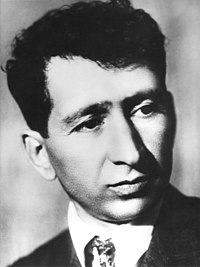Yegishe Charents
| Yeghishe Charents Եղիշե Չարենց |
|
|---|---|
 |
|
| Born | Yeghishe Soghomonyan March 13, 1897 Kars, Kars Oblast, Russian Empire |
| Died | November 27, 1937 (aged 40) Yerevan, Soviet Armenia |
| Resting place | unknown |
| Occupation | Poet, writer, translator, public activist |
| Language | Eastern Armenian |
| Nationality | Armenian |
| Spouse | Izabella Charents |
Yeghishe Charents (Armenian: Եղիշե Չարենց; March 13, 1897 – November 27, 1937) was an Armenian poet, writer and public activist. Charents was an outstanding poet of the twentieth century, touching upon a multitude of topics that ranged from his experiences in the First World War, socialist revolution, and, more prominently, on Armenia and Armenians. He is recognized as "the main poet of the 20th century" in Armenia.
An early supporter of communism, Charents joined the Bolshevik party, but as the Stalinist terror began in the 1930s, he gradually grew disillusioned with Stalinism and died during the 1930s purges.
Yeghishe Charents was born Yeghishe Abgari Soghomonyan in Kars (Eastern Armenia, then a part of the Russian Empire) in 1897 to a family involved in the rug trade. His family hailed from the Armenian community of Maku, Persian Armenia. He first attended an Armenian elementary school, but later transferred to a Russian technical secondary school in Kars from 1908 to 1912. He spent much of his time in reading. In 1912, he had his first poem published in the Armenian periodical Patani (Tiflis). In 1915, amid the upheavals of the First World War and the Armenian Genocide in the Ottoman Empire, he volunteered to fight in a detachment on the Caucasian Front.
Sent to Van in 1915, Charents was witness to the destruction that the Turkish garrison had laid upon the Armenian population, leaving indelible memories that would later be read in his poems. He left the front one year later, attending school at the Shanyavski People's University in Moscow. The horrors of the war and genocide had scarred Charents and he became a fervent supporter of the Bolsheviks, seeing them as the one true hope to saving Armenia.
...
Wikipedia
